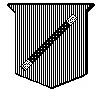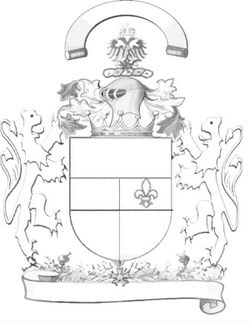Baton sinister
This article includes a list of references, but its sources remain unclear because it has insufficient inline citations. (September 2009) (Learn how and when to remove this template message) |

The baton sinister (alternatively baston[1]) is a charge used in heraldry.
Heraldic charge

It is a diminutive of the bend sinister and constitutes a narrow strip that runs from the upper right to the lower left of a coat of arms. Sinister (meaning left in Latin) is merely a directional indicator, and does not carry the negative connotations of the word in modern English.
It is commonly believed to be an indicator of an illegitimate birth in the family line, and is used in this way in literary contexts. However, in medieval England, there was no single mark of difference for bastardy. Until the late fourteenth century, the same marks of cadency were used for both illegitimate and legitimate children, but thereafter the arms of some bastards took the form of a plain or party field with their fathers' arms on a figure such as a bend, fess, chief, chevron or quarter.[2] The baton sinister can be seen in the arms of the Duke of Grafton, descended from an illegitimate son of King Charles II of England. Today, the College of Arms in England uses a bordure wavy to mark an armiger as illegitimate. The Court of the Lord Lyon in Scotland uses a bordure compony to denote the same.
Notes
- ↑ Millington, Ellen J. (1858) (in en). Heraldry in History, Poetry, and Romance. London: Chapman and Hall. p. 376. https://archive.org/details/heraldryinhisto00millgoog. "baton baston."
- ↑ Wagner, A. (1958). "Medieval Heraldry". in Poole, Austin Lane (in en). Medieval England: Vol. 1. Oxford: Clarendon Press. pp. 363–8. OCLC 398900. https://books.google.com/books?id=Lo9jewAACAAJ.
References
- This article incorporates text from a publication now in the public domain: Wood, James, ed (1907). "article name needed". The Nuttall Encyclopædia. London and New York: Frederick Warne.
- Friar, Stephen, ed (1987). A Dictionary of heraldry (1st ed.). New York: Harmony Books. ISBN 0517566656. https://archive.org/details/dictionaryofhera00fria.
External links
- Baton sinister in the arms of the Duke of Grafton
- Pembley's Dictionary of Heraldry
 |

